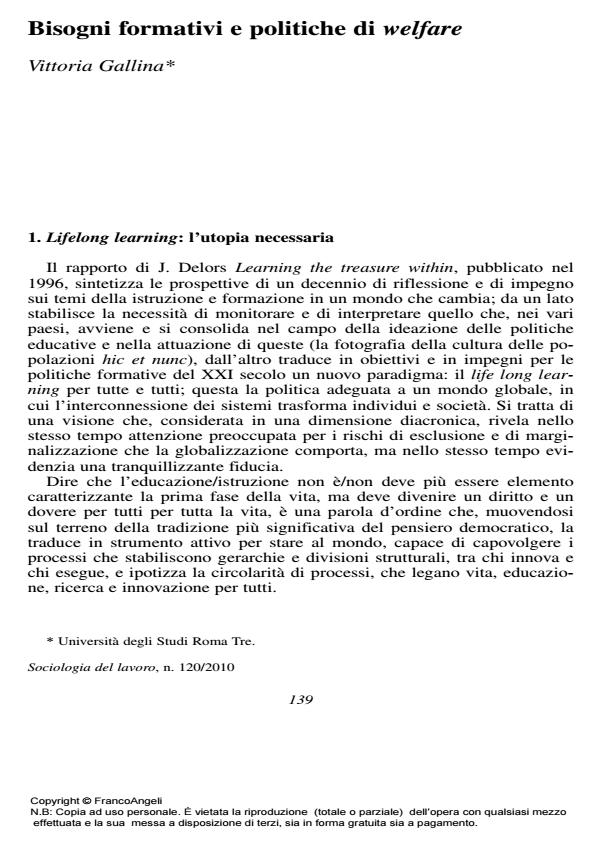Bisogni formativi e politiche di welfare
Titolo Rivista SOCIOLOGIA DEL LAVORO
Autori/Curatori Vittoria Gallina
Anno di pubblicazione 2011 Fascicolo 2010/120
Lingua Italiano Numero pagine 14 P. 139-152 Dimensione file 427 KB
DOI 10.3280/SL2010-120007
Il DOI è il codice a barre della proprietà intellettuale: per saperne di più
clicca qui
Qui sotto puoi vedere in anteprima la prima pagina di questo articolo.
Se questo articolo ti interessa, lo puoi acquistare (e scaricare in formato pdf) seguendo le facili indicazioni per acquistare il download credit. Acquista Download Credits per scaricare questo Articolo in formato PDF

FrancoAngeli è membro della Publishers International Linking Association, Inc (PILA)associazione indipendente e non profit per facilitare (attraverso i servizi tecnologici implementati da CrossRef.org) l’accesso degli studiosi ai contenuti digitali nelle pubblicazioni professionali e scientifiche
Il lifelong learning è la risposta che le politiche educative hanno saputo costruire alla fine del secolo scorso di fronte ai processi di mondializzazione del lavoro ed ai fenomeni migratori. La durezza e la complessità dei processi sociali indotti dal cambiamento produttivo nel mondo globale chiedono uno sforzo di conoscenza ed un impegno di risorse inedito, per contrastare processi di disgregazione sociale e per sostenere gli individui che "rischiano" nel mondo del lavoro flessibile. Le prospettive educative sono chiamate a inventare percorsi che aiutino gli individui a vedere lontano e a progettarsi al di là della occupazione just in time che il mercato del lavoro presenta oggi come unica, quasi, opportunità di inserimento sociale. Sistemi formativi/ istruttivi efficaci dovranno progressivamente abbandonare la illusoria valenza dei percorsi interdisciplinari, valorizzando invece la trasversalità di saperi e competenze e esplicitando le finalità di ogni fase del processo di apprendimento, al fine di attribuire a questo senso e valore per il soggetto che apprende.
Parole chiave:Coesione sociale, competenza, destrutturazione, capitale umano, match/mismacht, skills deficit/surplus
- La costruzione organizzativa della sicurezza: il ruolo della formazione Barbara Giullari, in SOCIOLOGIA DEL LAVORO 130/2013 pp.172
DOI: 10.3280/SL2013-130011
Vittoria Gallina, Bisogni formativi e politiche di <i>welfare</i> in "SOCIOLOGIA DEL LAVORO " 120/2010, pp 139-152, DOI: 10.3280/SL2010-120007